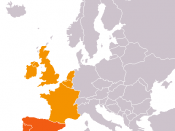From beginnings roughly about the year 1000, greater stability came to the lands of Western Europe. With the brief exception of the Mongol incursions, major barbarian invasions had ceased. The advance of Christian kingdoms and military orders into previously pagan regions in the Baltic and Finnic northeast brought the forced assimilation of numerous native peoples to the European entity.
The "High Middle Ages" describes the expansionist culture and intellectual revival from the late 11th century to the beginning of the 14th. The High Middle Ages saw an explosion in population. In central and northern Italy and in Flanders the rise of towns that were self-governing to some degree within their territories marked a beginning for re-urbanization in Western Europe.
In Spain and Portugal, a slow reconquest of the urbane and literate Muslim-ruled territories began. One consequence of this was that the Latin-literate world gained access to libraries that included classical literature and philosophy.
Through translations these libraries gave rise to a vogue for the philosophy of Aristotle. Meanwhile, trade grew throughout Europe as the dangers of travel were reduced, and steady economic growth resumed. This period saw the formation of the Hanseatic League and other trading and banking institutions that operated across Western Europe. The first universities were established in major European cities from 1080 onwards, bringing in a new interest and inquisitiveness about the world. Literacy began to grow, and there were major advances in art, sculpture, music and architecture. Large cathedrals were built across Europe, first in the Romanesque, and later in the more decorative gothic style.
The East-West Schism of 1054 formally separated the Christian church into two parts: Western Catholicism in Western Europe and Eastern Orthodoxy in the east. It occurred when Pope Leo IX and Patriarch Michael I excommunicated each other, mainly over disputes as...


